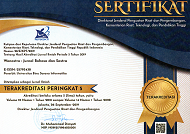Memaknai Nilai-Nilai Kemanusiaan Tokoh Utama Dalam Novel “Hijrah Bang Tato” Karya Fahd Pahdepie
Abstract
Novel "Hijrah Bang Tatato" by Fahd Pahdepi is a novel based on the true story of the main character, Lalan or Bang Tattoo who experienced the inner struggle to migrate from the dark as a thug to a better and obedient man. As a former thug, Bang Tato as the main character in the novel "Hijrah Bang Tattoo" experienced several phases of life that made him migrate. The phases are experienced by implementing the values of humanity in accordance with the religion it embraces, namely Islam. The meaning of humanity's values of the main character consists of guidance, endeavor, and go home. Therefore, the humanitarian values of the main characters are used as the background of the discussion and the title of this article. The method used is descriptive with the approach of sociology of literature and the meaning of human values itself. The data are examined based on the meaning of the text in the novel by using literature study data collection. Thus, the result is an understanding of the meaning of humanity values of the main characters can be used as a reflection for their readers as a reflection of social reality in society, especially in Indonesia.
Key Word : the values of humanity, meaning, the main character, the sociology of literature.
Full Text:
PDFReferences
Arikunto, Suharsimi. (2007). Manajemen Penelitian. Jakarta: Rineka Cipta. 234-236.
Awuy, Evie Sukayasa. (2014). Pengintegrasian Nilai-Nilai Kemanusiaan (Human Values) Dalam Pembelajaran Tematik Sekolah Dasar. Jurnal Kreatif Vol 17, No 2. http://jurnal.untad.ac.id/jurnal/index.php/Kreatif/article/view/2952/2030. 54-61.
Endraswara, Suwardi. (2013). Metodologi Penelitian Sastra. Yogyakarta: CAPS. 77-95.
Muslimin. (2011). Modernisasi dalam Novel Belenggu Karya Armijn Pane. ”Sebuah Kajian Sosiologi Sastra”. Jurnal Bahasa, Sastra, dan Budaya. Vol 1, No.1 Mei. 126-145.
Nurgiyantoro, Burhan. (2002). Teori Pengkajian Fiksi. Yogyakarta: Gadjah Mada University Press. 1-342.
Pahdepi, Pahd. (2017). Hijrah Bang Tato. Yogyakarta: Bentang. 1-246.
Pateda, Mansoer. (2001). Semantik Leksikal (Edisi Kedua). Jakarta: PT Rineka Cipta. 78-157.
Rafiek, M. (2013). Pengkajian Sastra: Kajian Praktis. Bandung: PT Refika Aditama. 127.
S, Gea Antonius Atosokhi Gea, Antonia Panca Yuni Wulandari, dan Yohanes Babari. (2003). Character Building I. Relasi dengan Diri Sendiri. Jakarta: PT Elex Emdia Komputindo. 1-233.
S, Gea Antonius Atosokhi Gea, Antonia Panca Yuni Wulandari, dan Yohanes Babari. (2005). Character Building II. Relasi dengan Sesama. Jakarta: PT Elex Emdia Komputindo. 141-162.
Suwardi (2011). Bahan Kuliah Sosiologi Sastra. FBS Universitas Negeri Yogyakarta. 1-193.
DOI: https://doi.org/10.31294/w.v10i1.3110
Copyright (c) 2018 Dina Purnama Sari

This work is licensed under a Creative Commons Attribution-ShareAlike 4.0 International License.
Index by:
Published by Department of Research and Community Service (LPPM) Universitas Bina Sarana Informatika by supported Relawan Jurnal Indonesia
Jl. Kramat Raya No.98, Kwitang, Kec. Senen, Jakarta Pusat, DKI Jakarta 10450

This work is licensed under a Creative Commons Attribution-ShareAlike 4.0 International License






